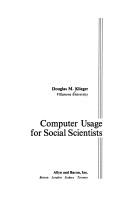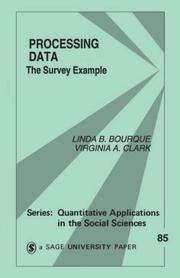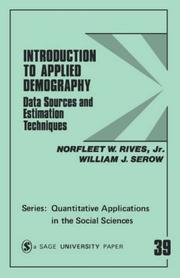| Listing 1 - 10 of 269 | << page >> |
Sort by
|

ISBN: 0205079628 9780205079629 Year: 1984 Publisher: London Allyn and Bacon
Abstract | Keywords | Export | Availability | Bookmark
 Loading...
Loading...Choose an application
- Reference Manager
- EndNote
- RefWorks (Direct export to RefWorks)
Book
ISBN: 3658228164 Year: 2018 Publisher: Wiesbaden : Springer Fachmedien Wiesbaden : Imprint: Springer Vieweg,
Abstract | Keywords | Export | Availability | Bookmark
 Loading...
Loading...Choose an application
- Reference Manager
- EndNote
- RefWorks (Direct export to RefWorks)
Wohin entwickelt sich das Internet? Werden einige wenige Global Player mit ihren digitalen Plattformen weiterhin den Markt und die Konsumenten beherrschen? Drohen Errungenschaften wie Demokratie, individuelle Freiheit und soziale Marktwirtschaft verloren zu gehen? In seinem Buch zeigt Olaf Berberich die Risiken des Web 4.0 für Bürger und Gesellschaft auf und entwirft einen Masterplan für eine digitale Transformation, die Demokratie und regionale Wertschöpfung sichert. Das Buch ist aus der Sicht der Bürger geschrieben, ohne dabei ein nachhaltiges Wachstum der Wirtschaft zu vernachlässigen. In vier Kapiteln entwickelt der Autor einen umfassenden Plan für eine bürgernahe und demokratisch verfasste digitale Transformation. Dazu gehören ein neues digitales Wertesystem, die digitale Bürgerbeteiligung sowie demokratische Spielregeln und dezentrale Wertschöpfungsketten. Darüber hinaus analysiert der Autor bereits sichtbare negative gesellschaftliche Fehlentwicklungen der Digitalisierung. Anhand konkreter Handlungsempfehlungen zeigt er, was passieren muss, damit einerseits die Demokratie nachhaltig in die digitale Gesellschaft übernommen wird und andererseits nicht die Menschen durch globale Systeme und künstliche Intelligenzen beherrscht werden. Sowohl die Bürger als auch die Wirtschaft werden unter fairen Bedingungen in die digitale Wertschöpfungskette eingebunden. Das Buch richtet sich nicht nur an Profis in den Bereichen Softwareentwicklung und Internet, sondern insbesondere an Politiker, Juristen, Soziologen, Volkswirtschaftler, Führungskräfte – und an alle, die sich für aktuelle gesellschaftliche, wirtschaftliche und politische Veränderungsprozesse interessieren. Der Inhalt 95 Thesen zur digitalen demokratischen Gesellschaft Grundlagen einer digitalen Demokratie Totalitarismus und Standardisierung Technische Verfahren für eine digitale Infrastruktur Dezentrales Wertschöpfungskonzept in globalen Strukturen Die Zielgruppen Politiker Soziologen Volkswirte Juristen Führungskräfte Öffentliche Hand Gesetzgebung Der Autor Olaf Berberich ist als FDP Mitglied in die Entwicklung einer digitalen Agenda eingebunden. Der ausgewiesene Datensicherheitsexperte und Innovationsgutachter treibt bereits seit vielen Jahren die Idee eines menschengerechten Internets voran. Sein 2016 erschienener Band „Trusted WEB 4.0 – Bauplan für die digitale Gesellschaft“ wird in der breiten Öffentlichkeit diskutiert. Während er dort die technische Machbarkeit dargelegte, entwickelt er in dem vorliegenden Buch seine Ideen für eine demokratische digitale Gesellschaft zu einem konkreten, alle Leistungsträger aus Wirtschaft und Gesellschaft umfassenden Masterplan.

ISBN: 0803947410 1412985498 1452214913 0585217076 9780803947412 Year: 1992 Volume: 07-085 Publisher: Newbury Park, Calif. Sage
Abstract | Keywords | Export | Availability | Bookmark
 Loading...
Loading...Choose an application
- Reference Manager
- EndNote
- RefWorks (Direct export to RefWorks)
Quantitative methods in social research --- Social sciences --- Sciences sociales --- Data processing --- Informatique --- #SBIB:303H510 --- #SBIB:303H10 --- -Behavioral sciences --- Human sciences --- Sciences, Social --- Social science --- Social studies --- Civilization --- Methoden sociale wetenschappen: statistische technieken, algemeen --- Methoden en technieken: algemene handboeken en reeksen --- Electronic data processing. --- Social sciences -- Data processing. --- Social Sciences --- Social Sciences - General --- Data processing. --- -Methoden sociale wetenschappen: statistische technieken, algemeen --- Social sciences - Data processing

ISBN: 1280034238 9786610034239 9264082131 9264176780 Year: 2000 Publisher: Paris : OECD Publishing,
Abstract | Keywords | Export | Availability | Bookmark
 Loading...
Loading...Choose an application
- Reference Manager
- EndNote
- RefWorks (Direct export to RefWorks)
This book provides high-level experts’ visions of how the information and communication technologies are providing exciting new research opportunities in the social sciences. It looks at the related infrastructure requirements, particularly at the international level, and highlights some of the barriers to the pervasive use of infrastructure. The book tackles complex questions such as developing infrastructure investments, disseminating best policy practices, developing new surveys - including a global social survey - and sharing research and information resources. It contributes to a better understanding of how policy reform could enhance the impact of the social sciences on efforts to solve global societal problems.
Social sciences -- Data processing. --- Social sciences -- Research. --- Social surveys -- OECD countries. --- Social sciences --- Social surveys --- Data processing. --- Research. --- Community surveys --- Surveys, Social --- Surveys --- Social science research --- Research --- Sciences sociales --- Data bases --- Data processing --- Banques de données --- Informatique

ISBN: 0803922736 0803921349 1412984637 145221574X 0585216908 9780803921344 Year: 1984 Volume: 07-039 Publisher: Beverly Hills, Calif. Sage
Abstract | Keywords | Export | Availability | Bookmark
 Loading...
Loading...Choose an application
- Reference Manager
- EndNote
- RefWorks (Direct export to RefWorks)
Micro-ordinateurs --- Microcomputers. --- 314 --- Demography --- Historical demography --- Social sciences --- Population --- Vital statistics --- 314 Demografie. Bevolkingsleer --- Demografie. Bevolkingsleer --- Quantitative methods in social research --- Computer. Automation --- Microcomputers --- Data processing --- Demography. --- Data processing. --- Démographie --- Sciences sociales --- Informatique --- Démographie --- Social sciences - Data processing
Book
ISBN: 9781446256565 9781446256558 1446256561 1446256553 Year: 2013 Publisher: Los Angeles, Calif. Sage
Abstract | Keywords | Export | Availability | Bookmark
 Loading...
Loading...Choose an application
- Reference Manager
- EndNote
- RefWorks (Direct export to RefWorks)
Qualitative methods in social research --- Kwalitatief --- NVivo --- #SBIB:303H4 --- #SBIB:303H30 --- PBIB --- Informatica in de sociale wetenschappen --- Kwalitatieve methoden: algemeen --- Methodiek --- sociaal-wetenschappelijk onderzoek --- Qualitative research --- Social sciences --- Data processing --- Qualitative research - Data processing --- Social sciences - Data processing
Book
ISBN: 0122869613 9780122869617 1322558981 148326579X Year: 1987 Publisher: Orlando, FL : Academic Press,
Abstract | Keywords | Export | Availability | Bookmark
 Loading...
Loading...Choose an application
- Reference Manager
- EndNote
- RefWorks (Direct export to RefWorks)
Social sciences --- Artificial intelligence. --- Sciences sociales --- Intelligence artificielle --- Statistical methods --- Data processing --- Mathematical models --- Méthodes statistiques --- Informatique --- Modèles mathématiques --- Social sciences-data processing --- Social sciences-mathematical models --- Social sciences-statistical methods
Book
ISBN: 3030000842 3030000834 Year: 2019 Publisher: Cham : Springer International Publishing : Imprint: Springer,
Abstract | Keywords | Export | Availability | Bookmark
 Loading...
Loading...Choose an application
- Reference Manager
- EndNote
- RefWorks (Direct export to RefWorks)
This book concisely presents a broad range of models and theories on social systems. Because of the huge spectrum of topics involving social systems, various issues related to Mathematics, Statistics, Teaching, Social Science, and Economics are discussed. In an effort to introduce the subject to a wider audience, this volume, part of the series “Studies in Systems, Decision and Control”, equally addresses the needs of mathematicians, statisticians, sociologists and philosophers. The studies examined here are divided into four parts. The first part, “Perusing the Minds Behind Scientific Discoveries”, traces the winding path of Syamal K. Sen and Ravi P. Agarwal’s scholarship throughout history, and most importantly, the thought processes that allowed each of them to master their subject. The second part covers “Theories in Social Systems” and the third discusses “Models in Social Systems”, while the fourth and final part is dedicated to “Mathematical Methods in the Social Sciences”. Given its breadth of coverage, the book will offer inquisitive readers a valuable point of departure for exploring these rich, vast, and ever-expanding fields of knowledge.
Social systems --- Evaluation. --- Engineering. --- Social sciences—Data processing. --- Social sciences—Computer programs. --- Computational Intelligence. --- Complexity. --- Computational Social Sciences. --- Construction --- Industrial arts --- Technology --- Computational intelligence. --- Computational complexity. --- Complexity, Computational --- Electronic data processing --- Machine theory --- Intelligence, Computational --- Artificial intelligence --- Soft computing
Book
ISBN: 3030019470 3030019462 Year: 2018 Publisher: Cham : Springer International Publishing : Imprint: Springer,
Abstract | Keywords | Export | Availability | Bookmark
 Loading...
Loading...Choose an application
- Reference Manager
- EndNote
- RefWorks (Direct export to RefWorks)
This volume covers selected topics addressed and discussed during the workshop “PDE models for multi-agent phenomena,” which was held in Rome, Italy, from November 28th to December 2nd, 2016. The content mainly focuses on kinetic equations and mean field games, which provide a solid framework for the description of multi-agent phenomena. The book includes original contributions on the theoretical and numerical study of the MFG system: the uniqueness issue and finite difference methods for the MFG system, MFG with state constraints, and application of MFG to market competition. The book also presents new contributions on the analysis and numerical approximation of the Fokker-Planck-Kolmogorov equations, the isotropic Landau model, the dynamical approach to the quantization problem and the asymptotic methods for fully nonlinear elliptic equations. Chiefly intended for researchers interested in the mathematical modeling of collective phenomena, the book provides an essential overview of recent advances in the field and outlines future research directions.
Computer simulation --- Mathematical models --- Models, Mathematical --- Simulation methods --- Differential equations, partial. --- Social sciences—Data processing. --- Social sciences—Computer programs. --- Partial Differential Equations. --- Computational Social Sciences. --- Mathematical Modeling and Industrial Mathematics. --- Partial differential equations --- Partial differential equations. --- Mathematical models.
Book
ISBN: 1447348230 1447348265 1447348249 1447348214 9781447348221 9781447348214 1447348257 1447348222 9781447348245 Year: 2019 Publisher: Bristol ; Chicago, IL Policy Press
Abstract | Keywords | Export | Availability | Bookmark
 Loading...
Loading...Choose an application
- Reference Manager
- EndNote
- RefWorks (Direct export to RefWorks)
This book analyses societal trends and controversies related to developments in data ownership, access, construction, dissemination and interpretation, looking at the ways that society interacts with and uses statistical data.
Social sciences --- Globalization --- Big data --- Data processing. --- Statistical methods. --- Social aspects. --- Data sets --- Data sets, Large --- Large data sets --- Social sciences - Data processing --- Social sciences - Statistical methods --- Globalization - Social aspects --- Big data - Social aspects
| Listing 1 - 10 of 269 | << page >> |
Sort by
|

 Search
Search Feedback
Feedback About UniCat
About UniCat  Help
Help News
News